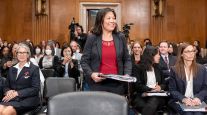Senior Reporter
Labor Department Seeks to Clarify Independent Contractor Status

[Stay on top of transportation news: Get TTNews in your inbox.]
The U.S. Department of Labor has issued a proposal to revise interpretation of independent contractor status under the Fair Labor Standards Act to “promote certainty for stakeholders, reduce litigation and encourage innovation in the economy.”
The Labor department’s proposed rule, posted in the Federal Register on Sept. 25, aims to bring “clarity and consistency” to determine who’s an independent contractor — and who’s not — according to a statement by Labor Secretary Eugene Scalia.
“Once finalized, it will make it easier to identify employees covered by the act, while respecting the decision other workers make to pursue the freedom and entrepreneurialism associated with being an independent contractor,” Scalia said.
Independent Contractor Status by Transport Topics
The Fair Labor Standards Act of 1938 is a law that broadly governs standards for minimum wage, overtime pay, recordkeeping and child labor.
Chris Spear, president of American Trucking Associations, said the proposal would expand opportunities for owner-operators in the trucking industry to earn and empower them to “choose the hours and routes that suit their individual needs and lifestyle.”
“This proposal is about giving working Americans the freedom to pick the occupation and flexibility they desire, and we thank Secretary Scalia for putting it forward,” Spear said.
The Labor department said its proposal intends to sharpen the issue into five distinct factors, instead of the five or more overlapping factors used by most courts and the department previously.
“The proposal marks a more significant venture for the DOL than its previous efforts to define the parameters for determining independent contractor status generally under the FLSA,” said a statement by the trucking law firm of Scopelitis, Garvin, Light, Hanson & Feary. “The proposal synthesizes various courts’ approaches to implementing the Supreme Court’s economic realities test.”
“Moreover,” the proposal stated, “consistent with the FLSA’s text, its purpose, and the department’s experience administrating and enforcing it, the department proposes that two of those factors — the nature and degree of the worker’s control over the work and the worker’s opportunity for profit or loss — should be more probative of the question of economic dependence or lack thereof, and thus are afforded greater weight in the analysis than any others.”
Scopelitis said: “If both core factors indicate either independent contractor status or employee status, no further inquiry would be needed under the proposed rule. In the customary and usual fact patterns found in trucking, both core factors should most often point in the direction of independent contractor status.”

Home | Video | Heroes' Photo Gallery
Saluting the men and women of the trucking industry who kept America's essential goods flowing during the coronavirus pandemic.
Heroes: Peter Lacoste | Susan Dawson | James Rogers | Reggie Barrows | Kevin Cooper | Cesar Quintana Moreno
However, if the two factors fail to determine the status, three other factors can serve as additional guideposts in the analysis. They include: the amount of skill required for the work, the degree of permanence of the working relationship between the worker and the potential employer, and whether the work is part of an integrated unit of production, the proposal said.
The proposal advises that the actual practice is more relevant than what may be “contractually or theoretically possible in determining whether a worker is an employee or an independent contractor.”
The agency is seeking comment on the proposal through Oct. 26.
“We appreciate the administration’s efforts to provide clarity on this complex issue and are encouraged to see that they are working within the existing framework for classifying employees under FLSA,” said a spokeswoman for the Owner-Operator Independent Drivers Association. “With that said, given the complexities of this issue, we are still reviewing all details of the proposal.”
Want more news? Listen to today's daily briefing:
Subscribe: Apple Podcasts | Spotify | Amazon Alexa | Google Assistant | More




